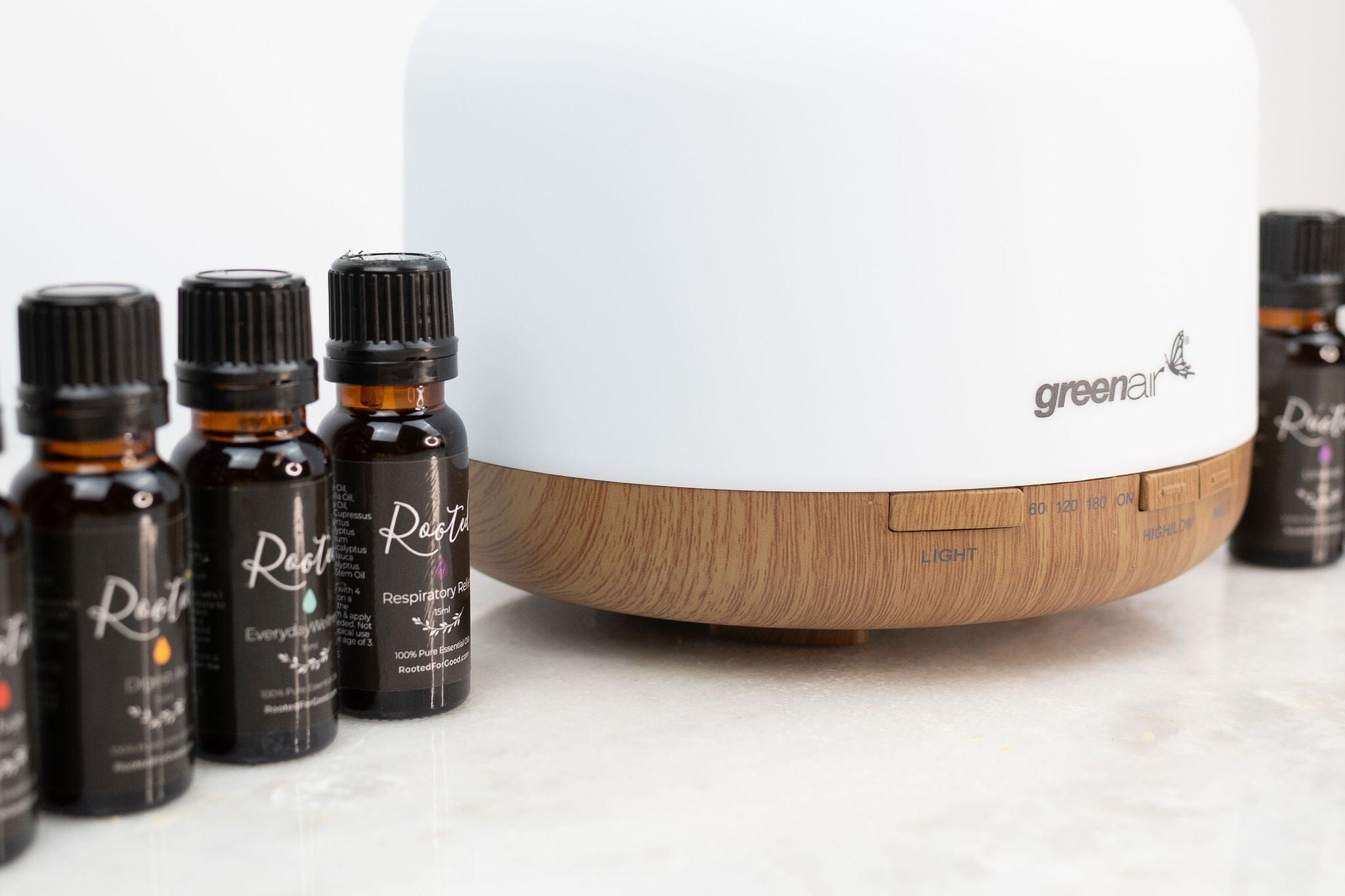Key Takeaways
- Essential oils are commonly marketed for depression relief, prompting curiosity about their effectiveness.
- The author is a licensed cosmetologist and founder of Rooted For Good, bringing personal and professional insight.
- The guide aims to provide honest, science-backed information about using essential oils for depression.
- Many people feel overwhelmed by the variety of essential oil products available for mental health.
- Real ingredients can have meaningful impacts when applied thoughtfully in daily life.
Table of Contents
- Essential Oil for Depression: Honest Science-Backed Guide
- What Is Depression, Really?
- What Are Essential Oils?
- Can Essential Oils Help with Depression?
- How Essential Oils Affect Mood: The Science Behind the Scent
- Best Essential Oils for Depression: Evidence, Uses, and Real-Life Tips
- Lavender vs. Bergamot: A Head-to-Head Comparison
- Essential Oil Safety: What Every User Needs to Know
- How to Use Essential Oils for Depression: Simple Routines for Real Life
Essential Oil for Depression: Honest Science-Backed Guide
Ever found yourself standing in the wellness aisle, overwhelmed by essential oil for depression labels, and wondering: "Could something this simple really help?" As a licensed cosmetologist, mom of six, and founder of Rooted For Good, I know that feeling, and I know the power of real ingredients in real life.
Goodness. Truth. Real Beauty. At Rooted For Good, I believe beauty, and wellness, is for everyone, in every season and circumstance. Our products are handcrafted with 100% natural ingredients and therapeutic-grade essential oils, no toxins, no fillers, because I want what touches your skin to be as honest as the love you give your family. And because care goes beyond skin, 10% of every sale helps support clean water, safe housing, and opportunity for families in need. Our essential oil bundle is a great way to get started with high-quality, therapeutic-grade oils for your wellness journey.
What You'll Learn in 60 Seconds
- Which essential oils have real research for mood support
- How to use them safely alongside other treatments
- Simple routines that fit busy, real lives
- When oils help, and when they don't
What Is Depression, Really?
Depression isn't just sadness, it's a serious, complex condition affecting over 300 million people worldwide. Clinical depression involves persistent low mood, loss of interest, and physical symptoms that interfere with daily life for at least two weeks. Unlike situational sadness from loss or stress, clinical depression often lacks a clear trigger and doesn't improve with positive life changes alone.
Conventional treatments like SSRIs and SNRIs can take 4–6 weeks to show effects, and only work well for about half of those who try them. Side effects, from nausea to sexual dysfunction, drive many people to seek complementary approaches. That's why so many moms, students, and busy professionals are exploring safe, natural ways to support their mental health alongside professional care.
Track your mood daily for two weeks to notice patterns. If symptoms persist longer than two weeks or interfere with work, relationships, or daily activities, seek professional help. Consider therapy, medication, lifestyle changes, and complementary options like essential oil for depression support, all as part of a complete wellness approach. For more holistic tips, you might also enjoy these 3 essential oils for overall health and wellness.
What Are Essential Oils?
Essential oils are concentrated plant essences extracted through steam distillation, cold pressing, or other natural methods. That little bottle contains hundreds of volatile compounds from flowers, leaves, bark, or roots, concentrated into a potent form that captures the plant's therapeutic properties.
At Rooted For Good, we use only therapeutic-grade oils extracted without synthetic solvents, fillers, or artificial fragrances. Every label lists exactly what's inside, lavender from Bulgaria, bergamot from Italy, chamomile from Egypt, with no vague "fragrance" or hidden toxins. What's excluded matters as much as what's included.
Store oils in dark glass bottles away from heat and sunlight, and use within one year for best potency. Learn to read labels: if you can't pronounce an ingredient or the company won't disclose sourcing, ask questions. Quality oils should smell true to their plant source, lavender should smell like fresh lavender, not generic "floral."
Can Essential Oils Help with Depression?
Research shows essential oil for depression support works through the limbic system, the brain's emotional center. When you inhale lavender or bergamot, aromatic molecules reach olfactory nerves within seconds, potentially influencing mood-regulating neurotransmitters like serotonin and dopamine.
Small clinical studies demonstrate measurable benefits: lavender inhalation reduced anxiety scores by 30-40% in hospital patients, while bergamot aromatherapy lowered cortisol levels and improved mood in stressed adults. A 2017 study found chamomile essential oil helped reduce symptoms in people with mild to moderate depression when used alongside standard care.
However, effects are typically mild to moderate, and studies remain small. Essential oils complement, never replace, professional treatment for clinical depression. They're most effective for daily mood support, stress management, and enhancing sleep quality, which indirectly supports mental health. Always use them as part of a comprehensive approach that includes therapy, medication when appropriate, and lifestyle changes. For more on supporting restful sleep, see our guide to essential oil for sleep.
How Essential Oils Affect Mood: The Science Behind the Scent
When you inhale an essential oil, aromatic molecules travel through your nose to the olfactory bulb, which connects directly to the limbic system, your brain's emotional processing center. This pathway bypasses conscious thought, creating immediate physiological responses that can shift mood, stress levels, and even heart rate within minutes.
Specific compounds like linalool in lavender and limonene in bergamot may interact with GABA receptors, promoting calm, while also supporting healthy cortisol patterns. Topical application allows these compounds to enter the bloodstream slowly, providing longer-lasting but gentler effects than inhalation.
For best results, inhale oils for 1-5 minutes, 3-4 times daily. Try topical application using one drop diluted in one teaspoon of plant-based carrier oil, applied to wrists or feet. For nighttime support, diffuse 20-30 minutes before bed. Rooted For Good oils are properly diluted and contain no harsh chemicals or undisclosed "fragrance" that could irritate sensitive systems.
Best Essential Oils for Depression: Evidence, Uses, and Real-Life Tips
Lavender vs. Bergamot: A Head-to-Head Comparison
Both are gentle, evidence-backed, and Rooted For Good favorites, but they have different "personalities" that serve different needs throughout your day and emotional journey.
Lavender excels as your evening companion, with strong research supporting its use for anxiety and sleep disorders that often accompany depression. Its floral, soft scent signals your nervous system to downshift, making it perfect for bedtime routines or midday stress breaks. Bergamot shines as your morning motivator, with growing research on its mood-lifting citrus brightness that can counter the heavy feeling of depression without overstimulation.
| Feature | Lavender | Bergamot |
|---|---|---|
| Best Time of Day | Night | Morning/Afternoon |
| Main Effect | Calm, sleep, relaxation | Uplift, energy, clarity |
| Research Support | Strong (anxiety, sleep) | Growing (mood, stress) |
| Skin Sensitivity | Very gentle | Use with care (photosensitivity) |
| Scent Profile | Floral, soft | Citrus, bright |
| Best For | Sleep, stress, sensitive skin | Mood boost, focus, gentle pick-me-up |
For sensitive skin, dilute both oils using one drop per two teaspoons carrier oil. Try lavender at bedtime and bergamot at your desk for complementary mood support throughout the day. Blend one drop lavender plus one drop bergamot for a balanced midday reset that neither overstimulates nor sedates.
Rooted For Good sources both oils from their optimal growing regions, Bulgarian lavender and Italian bergamot, ensuring the highest concentration of mood-supporting compounds without synthetic additives or chemical processing that can diminish therapeutic benefits. For more ways to use essential oils, check out our tips on essential oils for bug bites.
Essential Oil Safety: What Every User Needs to Know
As a licensed cosmetologist and mom, I take safety seriously. These plant extracts are potent, respect their power while enjoying their benefits.
Proper Dilution and Patch Testing
Always dilute essential oils before skin contact. Start with a 1:50 ratio, one drop essential oil to fifty drops plant-based carrier oil. Apply a diluted drop inside your elbow, wait 24 hours, and watch for any redness or irritation before regular use. This simple step prevents most adverse reactions.
Medication Interactions and Depression Treatment
Essential oils can complement antidepressant medications, but timing matters. Some compounds may enhance or interfere with medication absorption. Always inform your healthcare provider about essential oil use, especially if you're starting new depression treatments or adjusting dosages. For more information on medication interactions, visit the National Institute of Mental Health's depression resource.
Pregnancy, Children, and Sensitive Populations
Pregnancy requires extra caution with essential oils. Lavender and chamomile are generally considered safe when properly diluted, but bergamot and other citrus oils may increase photosensitivity. For children, use only lavender or chamomile with extra dilution, one drop per four teaspoons carrier oil, and never without supervision.
Storage and Handling Best Practices
Store oils in dark glass bottles away from heat, sunlight, and children. Bergamot can cause skin discoloration in sunlight for up to 12 hours after application. If irritation occurs, wash the area with soap and water, apply plain carrier oil, and discontinue use.
Emergency Response: If essential oil gets in eyes, flush with plant-based carrier oil (not water), then seek medical attention. Keep poison control number handy: 1-800-222-1222.
Quality matters for safety. Rooted For Good tests every batch for purity and provides complete ingredient transparency, so you know exactly what touches your skin and reaches your respiratory system. For more on safe use, you can also read this Mayo Clinic article on depression and wellness.
How to Use Essential Oils for Depression: Simple Routines for Real Life
Aromatherapy works best when woven into existing habits, not added as another overwhelming task. Here's how to make essential oil support seamless and sustainable. If you're interested in other ways essential oils can support your health, check out our guide to essential oil for cough.
Morning Mood Support Routine
Start with bergamot for gentle energy. Place one drop in your palms, cup hands over nose, and breathe deeply three times while coffee brews. Alternatively, add two drops to your diffuser while getting ready, the citrus scent naturally counters morning heaviness without the jitters of extra caffeine.
Midday Stress Reset Techniques
Keep a small roller bottle with lavender diluted in jojoba oil at your desk. When overwhelm hits, roll onto wrists and inhale while counting to ten. The combination of scent and intentional breathing interrupts stress cycles that can deepen depressive episodes.
Evening Wind-Down Protocol
Begin your bedtime routine 30 minutes earlier with chamomile or lavender in the diffuser. Add two drops of either oil to one tablespoon plant-based carrier oil, then massage into feet while reflecting on one positive moment from your day. This physical and mental transition signals your nervous system to prepare for restorative sleep.
Quick Mood Rescue Methods
Create an emergency mood kit: cotton balls infused with your preferred essential oil in a small tin. When depression hits unexpectedly, during commutes, meetings, or social situations, discreetly inhale from the tin while focusing on your breath. The portability ensures support is always available.
Frequently Asked Questions
How do essential oils like lavender and bergamot influence brain chemistry to help with depression?
Lavender and bergamot essential oils can influence brain chemistry by interacting with the limbic system, the part of the brain that regulates emotions. Their calming scents may help reduce anxiety and promote relaxation, which can support a more balanced mood when used thoughtfully.
Can essential oils be safely used alongside conventional depression treatments such as SSRIs or therapy?
Yes, essential oils can often be used safely alongside conventional treatments like SSRIs or therapy, but it’s important to consult with a healthcare provider first. Essential oils are complementary tools, not replacements, and professional guidance ensures they fit well within your overall care plan.
What are the most effective ways to incorporate essential oils into a daily routine for mood support?
Simple methods like diffusing essential oils, adding a few properly diluted drops to a bath, or using them in a gentle massage can be effective. Consistency matters, so integrating these steps into your daily routine, morning or evening, can help support mood in a manageable, real-life way.
When should someone seek professional help instead of relying solely on essential oils for depression?
If symptoms of depression persist for more than two weeks, interfere with daily life, or include thoughts of self-harm, it’s important to seek professional help promptly. Essential oils can support wellness but are not a substitute for medical diagnosis and treatment when depression is serious or ongoing.





